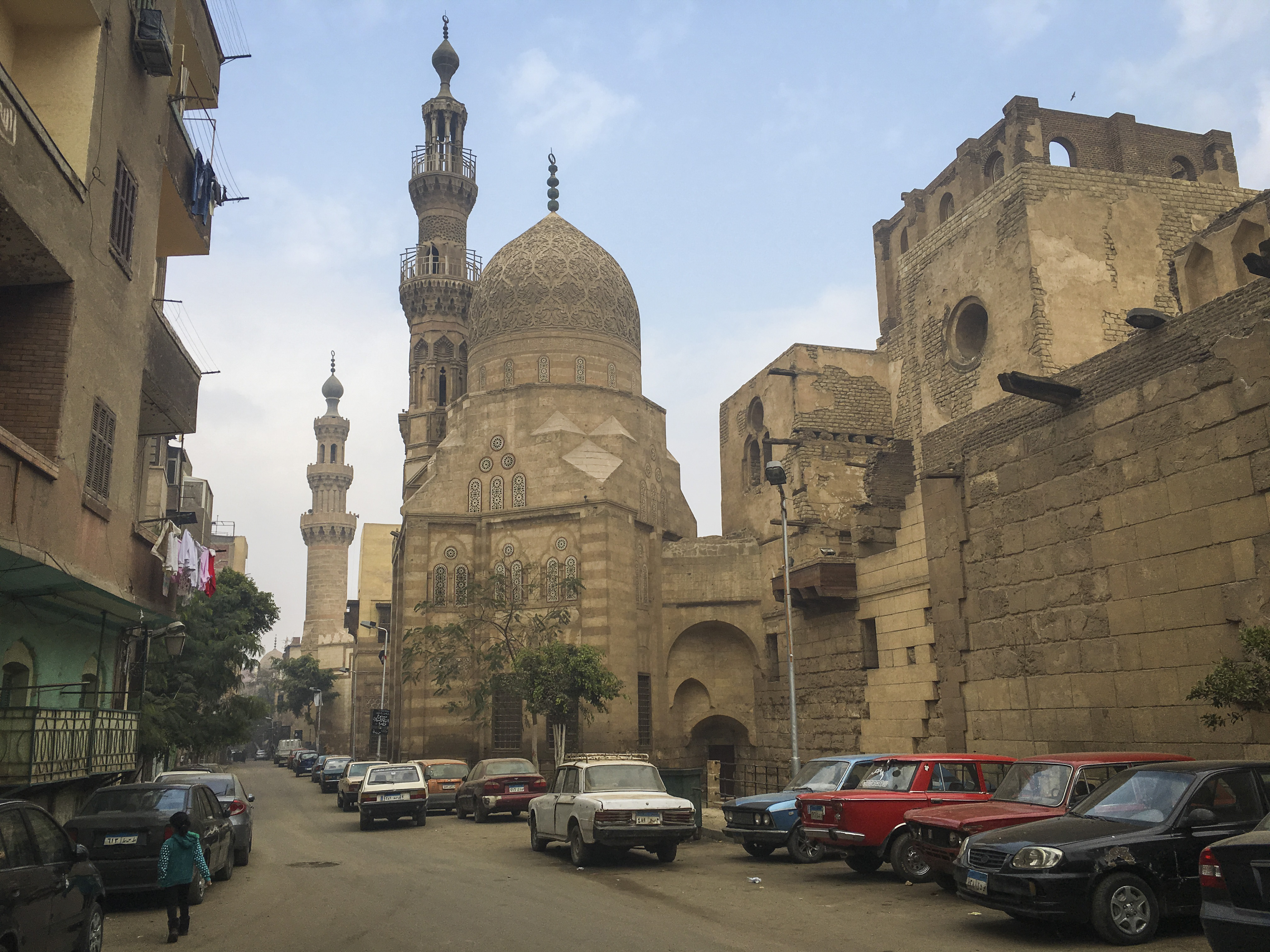Kenya, South Africa and Tanzania are waging a war on poaching, but one of the greatest challenges to winning it is corruption among the people fighting it.
Secretive criminal syndicates pay off police, judges and customs officials to keep their lucrative trade moving. The cartels operate on the basis of “take the money or the bullet,” causing many officials to turn a blind eye to their activities.
Favors or power may be traded in addition to money. And, in some cases, corruption hides behind incompetence, according to Elizabeth Gitari, a legal officer at Wildlife Direct in Kenya. She says some cases against poachers have been compromised by defective charge sheets, which she suggests may be a deliberate effort by lower level officials to ensure the cases are not heard.
“The price of paying a prosecutor or court clerk, for instance, is lower than bribing a magistrate or a judge,” Gitari says.
Even people paid to protect Kenya’s wildlife have been accused of being complicit in poaching. Local media have reported several rhino horns disappeared from various storerooms managed by the Kenya Wildlife Service (KWS) in recent years. No signs of forced entry suggest theft or complicity by an insider. But KWS rejects claims that public officials are colluding with traffickers.
“The price of paying a prosecutor or court clerk, for instance, is lower than bribing a magistrate or a judge”
In 2015, it conducted Kenya’s first-ever comprehensive inventory of national ivory stockpiles, counting 137 tons of elephant ivory and 1.5 tons of rhino horn. Environment Cabinet Secretary Judi Wakhungu says the audit showed KWS’ storage systems are robust and will be strengthened further.
“Kenya will put in place strong systems to enhance security and management of Kenya’s trophy stockpile,” she told journalists at a press conference in Nairobi last October.
Securing Kenya’s wildlife – dead or alive – is a challenge because of the country’s porous borders and coast. Gitari notes the port of Mombasa is a major conduit in and out of Africa, and has played a vital role in moving ivory and rhino horns from the country to Asia and other destinations.
“Given that we are the port of entry in East Africa, and we see a lot of ivory going out of the Mombasa port, it means there is corruption at the border points of these countries,” she says.
More than 500 pieces of elephant ivory weighing 3,100 kilograms was seized at a Thai port hidden in a container shipped from the Mombasa port last year. The container was marked as tea leaves transported from Kenya to Laos, where the illegal ivory trade is thriving.
The Kenya Ports Authority says its mandate is to facilitate services required for transporting containers and ships. It does not oversee packaging of goods into the containers, which is a mandate of the Kenya Revenue Authority. KRA did not respond to requests for comment.
Bernard Osero, a corporate communications officer for the Kenya Ports Authority, says in previous years, contraband passed through the port via tea shipments. Tea is such an important export that it is exempt from scanning to ensure it meets international auction deadlines.
Osero says CCTV surveillance, motion detector alarms, fingerprint scanners and dogs are all being used to sniff out contraband such as ivory and drugs.
Ivory is a lucrative trade in China and Vietnam, where it is used for medicinal purposes and is a symbol of wealth. More than 24,000 elephants were killed for their ivory tusks across Africa in 2015, according to the international wildlife charity Born Free.
The number is high, but the population is beginning to stabilize, according to The Convention of the Trade in Endangered Species of Wild Fauna and Flora (CITES).
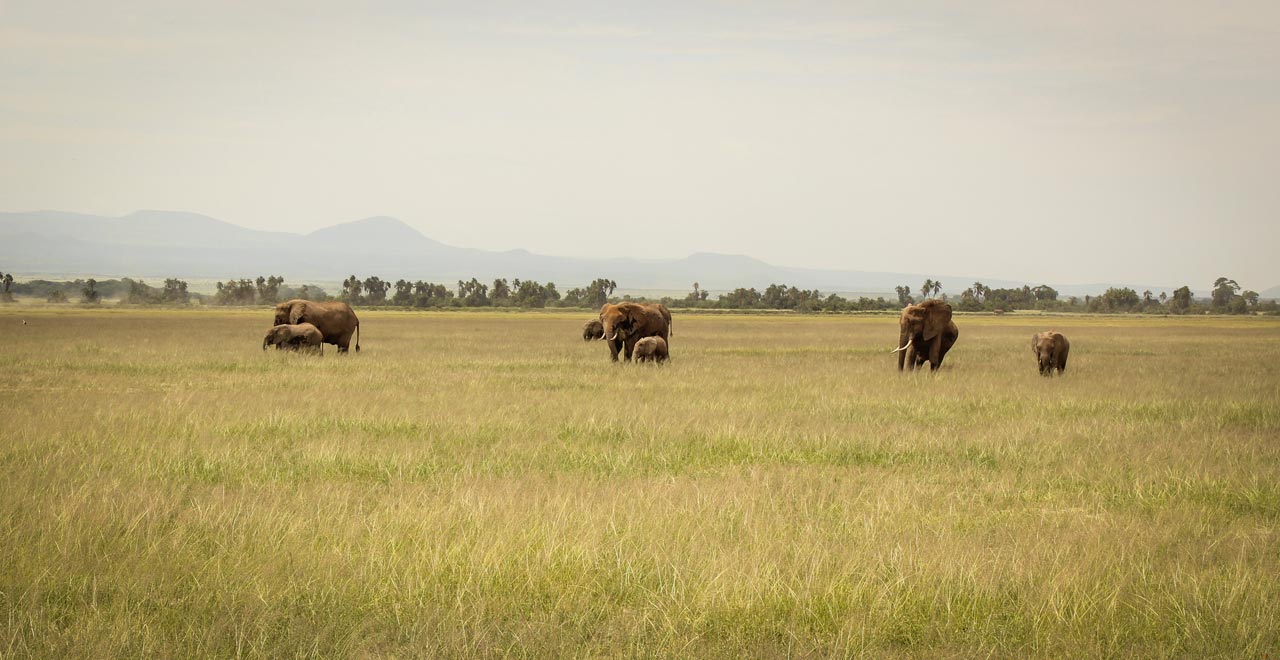
“There are some encouraging signs, including in certain parts of Eastern Africa, such as in Kenya, where the overall poaching trends have declined, showing us all what is possible through a sustained and collective effort with strong political support,” John Scanlon, CITES Secretary General said recently.
Getting that support from all levels of society, however, is difficult. In early March, four administrative police officers were arrested with elephant tusk in Nairobi. Caught in a government-owned vehicle, they were charged with possession of a wildlife trophy after trying to sell five kilograms of ivory. The four denied the charges.
In February, Kenyan officials arrested two suspected poachers linked to the killing of a pregnant black rhino. The expectant mother was found dead with her horns slashed off in the Ol Pejeta Conservancy of Kenya’s Laikipia county. And in July 2015, a mother elephant and four young elephants were found dead in Tsavo West National Park, their tusks missing. The Kenya Wildlife Service says two suspects were arrested in the case.
“IN 2013, THERE WERE 56 SEIZURES OF IVORY IN TANZANIA TOTALLING 8,255KG”
Neighbouring Tanzania has lost more elephants to poaching than any other country in Africa. It is also the biggest source of illegal ivory seized in the world.
Last year, three Chinese nationals managed to smuggle 262 kilograms of ivory out of Tanzania’s Julius Nyerere International Airport. Swiss authorities detained the men in the Zurich airport before they were able to carry the $413,000 worth of ivory to China.
Tanzania’s former minister for Natural Resources and Tourism, Khamis Kagasheki, says he knows first-hand that corrupt government officials are a huge part of the problem.
“Poaching is a criminal activity that has strong barons behind it and, therefore, if you decide to take them, be sure you are entering a dangerous territory,” he says.
In 2013, while still in government, Kagasheki launched “Operation Tokemeza,” a multi-ministry effort to end poaching in Tanzania. Tokomeza is a Swahili word meaning “to eradicate.” The results of the operation came quickly. For the first time in over a decade, more illegal ivory was seized in Tanzania than in transit to, or in, the Far East.
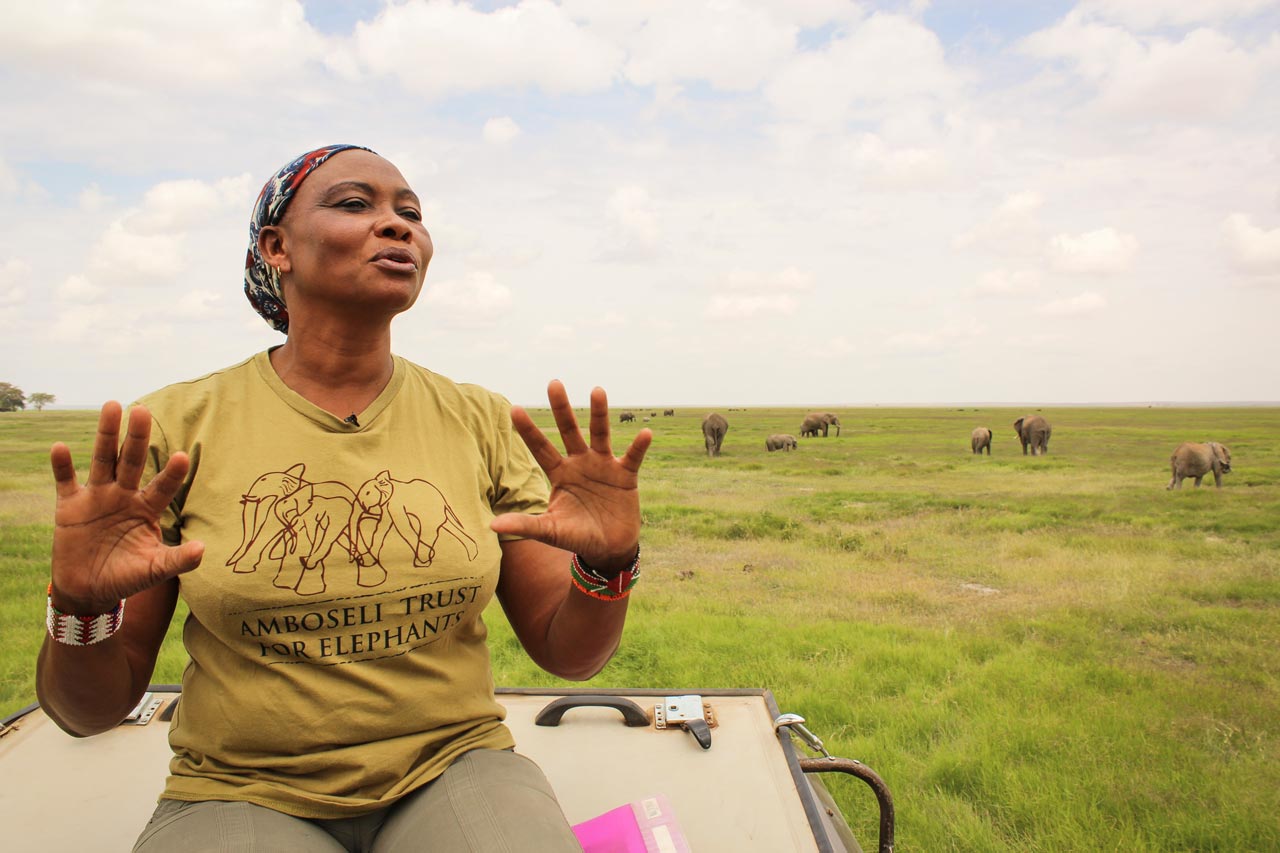
In the first year of the operation, 8,255 kilograms of ivory were seized in 56 raids, the equivalent of what had been recovered in the last decade. In addition, 216 suspected poachers and traffickers were brought to court.
The crackdown did not last long. Kagasheki and three other ministers were forced to resign after a report by a parliamentary select committee implicated the government of gross human rights violation during the implementation of Operation Tokemeza. Later in the year, then-president Jakaya Kikwete called off the operation.
The Arts Against Poaching
Maurice Oniang’o and Andrew Ochieng
Don’t tell Kirsten Everett young people should be seen and not heard.
The 17-year-old is the author of two e-books and has nearly 2,000 followers on Twitter. And when she’s not publishing her thoughts online, she’s wearing them on her sleeve. Literally. A picture of a rhino, its horns intact, emblazons the blue T-shirt she’s wearing. Everett is an ambassador for Rhino S.A, a youth-driven campaign to raise awareness about the slaughter of South Africa’s rhinos.
She fell in love with the endangered animal on a game drive with her family. As they waited for a mother rhino and her calf to move out of the road, their guide mentioned South Africa is losing its rhinos at an alarming rate because of poaching.
Everett says she felt compelled to speak out for the rhinos because they can not speak for themselves.
“We are the generation that will be blamed if we lose these beautiful species,” she says. “We are the generation that our grandchildren will stand up and ask, ‘What did you do?’”
An estimated 25,000 rhinos roam the continent, nearly 80 percent of them in South Africa. Their ivory tusks, a lucrative trade in Asia, are so coveted by poachers that conservationists warn the animals are on track to extinction.
Discovering this, Everett used her pen as a sword in the fight against poaching. She wrote two books, Eclipse Child and Escaping Extinction. The fictional stories, available on Kindle, follow the adventures of Bethany Clark, a young girl with superpowers, trying to save endangered rhinos from a world of “merciless greed.”
In many ways, Everett is like her fictional hero. She is, at least, as passionate.
“We have lost so many rhinos so far and we cannot afford to lose anymore or else we are not going to have any rhinos,” Everett says.
She shares this passion by writing and editing Rhino S.A.’s annual newsletter and by speaking at schools and institutions.
Everett says she believes strongly in educating young people so that by the time they take up leadership roles in society, they will have the knowledge and skills needed in any situation. But, she adds, they should not wait until they are adults to speak out against poaching – they should use drawing, poetry and painting to spread the message now.
Everett notes that poaching is intertwined with other factors like corruption and a lack of information. In an exchange with scouts from Hong Kong, she realized there is a disconnect between Africa, where the poaching happens, and Asia, where the wildlife trophies are sold.
“The people who use these products do not even know that for them to get it, an animal was brutally killed and its horns hacked off,” she says.
Realizing this, the young ambassador hopes to expand her activism to a global scale.
“I would like to see people from Rhino S.A. skyping or communicating with an entire community in Asia, with people that are able to embrace that,”Everett says. “That’s going to make a difference.”
Conservation through talent
By Maurice Oniango and Andrew Ochieng
One afternoon while browsing the Internet at a local cyber café in Ruvuma, Tanzania, Shubert Mwarabu saw an image that changed his life.
His friend had posted a photo of a dead elephant with its face hacked and tusks missing. Mwarabu could not comprehend what had happened to the animal, so he called his friend for an explanation. At the time, in 2011, “poaching” and “ivory” were foreign words to him.
Mwarabu discovered Tanzania had lost more than 60 percent of its elephants through poaching. Fifty years ago, as many as 300,000 elephants roamed the country. Today, an estimated 43,000 elephants are left.
Mwarabu was so distraught, he started Facebook and Twitter campaigns against the illegal slaughter of wildlife. He even loaned his voice to the movement, recording songs urging the public to join the fight.
“Let’s Fight Poaching,” or “Tupige Vita Ujangili” in KiSwahil, was his first release.
“The song tells that previously Tanzania was a country with a good conservation status, but nowadays is referred to as a hotspot for elephant poaching,” explains the 29 year-old singer and activist.
The lyrics also urge people to report poachers operating in their communities. Tanzania’s national radio station liked the message and pumped the song across the airwaves. His other songs, “Save Tanzania’s Elephants,” and “United for Wildlife,” tackle the relationship between poaching and terrorism. “Letter to CITES” sends a special message to the Convention on International Trade on Endangered Species of Wild Flora and Fauna (CITES) to ban the trade of ivory worldwide.
Mwarabu says he is saddened his efforts and those of fellow conservationists have been unrewarded because of corruption and system breakdowns. He says as an activist, he can only do advocacy and lobbying, but the key player in saving the elephants is the government.
“I can’t arrest a poacher. I can’t prosecute them. And I can’t change policy. This is a war in the hands of the government, and without political will, our elephants will be extinct,” says Mwarabu.
He says anti-poaching efforts need to be strengthened on both a large and small scale. He relays the time he tried using a number he says Tanzania’s Wildlife Agency gave the public to report suspected poachers. His calls went unanswered despite trying several times for four days. On the fifth day, Mwarabu says someone unrelated to the agency answered and asked why his number appeared so many times that week.
The activist says Tanzania’s judicial system seems as ineffective as that number.
He points to delays in the case of Yang Feng Glan, the 66 year-old suspected leader of a global poaching syndicate. Tanzanian authorities arrested Yang, better known as the “Queen of Ivory,” last October and charged her with smuggling 706 tusks worth approximately $2.5 million between 2000 and 2014.
“After the arrest and a few court appearances, we do not see any progress,” says Mwarabu. ”Can anyone say there is not enough evidence? If not, why was she the most wanted and hunted for years?”
Months after her arrest, Yang remains in jail awaiting trial. Her lawyer says she is innocent.
The case spurred Mwarabu to join other activists in signing an open letter to the new president, Dr. John Pombe Magufuli, urging him to address the drastic decline in Tanzania’s elephant population.
It asks the government to arrest and prosecute major ivory traders in Tanzania, regardless of nationality or status. The letter urges the president to use the country’s long-standing friendship with China to close Chinese ivory markets where up to 90 percent of Tanzania’s ivory is destined. It also demands the public destruction of Tanzania’s seized ivory stockpiles, the largest in the world.
Mwarabu is among major Tanzanian celebrities, scientists, academics and journalists who signed the open letter. They are hoping their high profile campaign to end poaching will become trendy, even with the president.
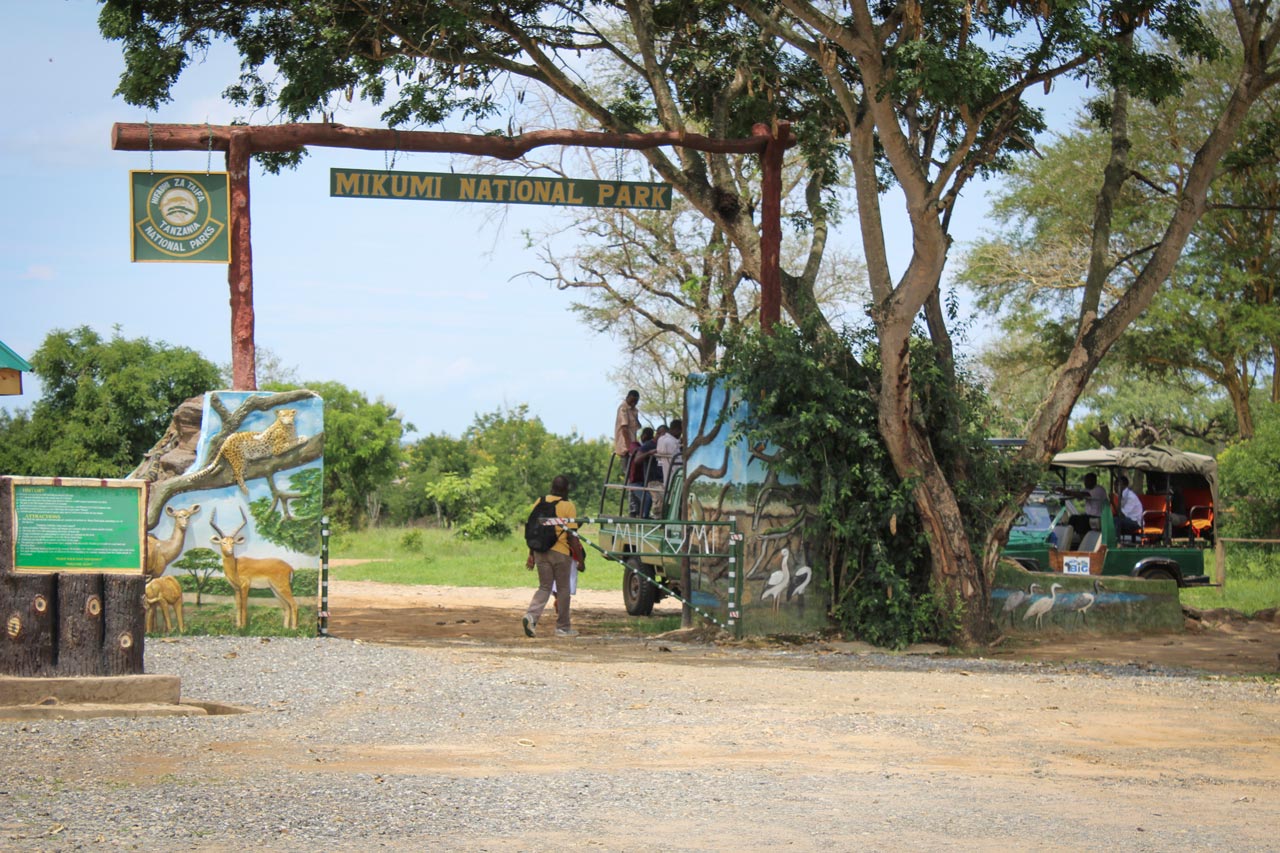
Kagasheki claims this was an attempt by powerful, corrupt individuals to stop him from thwarting poaching.
“Some [members of parliament] were paid to make sure I was out of office because I was a stumbling block, and getting me out it would go back to business as usual,” he says. His claims can not be proven.
The country’s elephant population has dropped 60 percent since 2009, according to Tanzania’s latest elephant census. An estimated 40,400 to 46,600 of the animals remain.
Tanzania’s Natural Resources Minister Lazaro Nyalandu blames the dramatic decline in part on migration. The UK-based Environmental Investigation Agency says corruption is a more plausible reason for the loss of elephants.
The group says graft is woven throughout the country, from game rangers who provide information on patrol patterns and the location of elephant herds, police who rent out weapons and transportation, and customs officials who allow containers of ivory to flow out of the ports.
Tanzania’s new president, Dr. John Pombe Magufuli, is giving conservationists some hope. He has vowed to fight the scourge of poachers. Former minister Kagasheki says he is seeing some positive change.
“This is the first time in history we have seen the judiciary taking the issue of poaching seriously,” Kagasheki says.
As Tanzania and Kenya grapple with poaching, South Africa is also struggling to protect its rhinos. The country is home to about 80 percent of the world’s rhino population, but there are fears they could be extinct in the next 10 years if the killing continues at its current rate.
Official figures from South Africa’s Department of Environmental Affairs indicate more than 5,000 rhinos have been killed in less than a decade.
In 2007, 13 rhinos were killed. In 2014, 1,215 were slaughtered – the highest number ever recorded. In 2015, 1,175 killings were reported.
As the government celebrates this drop in poaching, conservationists are less excited.
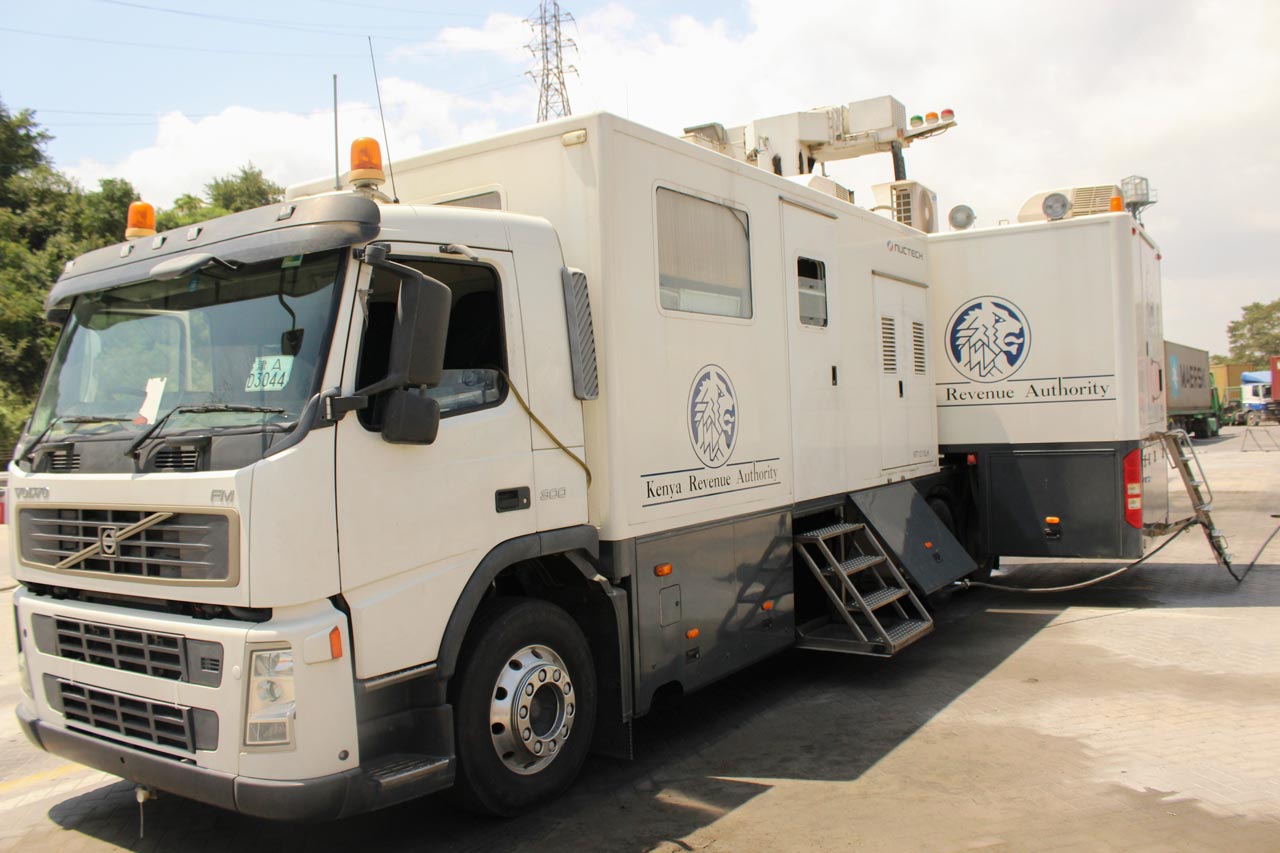
Environmental journalist Serusha Govender, who has been reporting on poaching for nearly a decade, says conservationists are right to remain concerned.
“We say the numbers have gone down, yet we are not saying it went down by 1,000. We are saying it went down by 100. That is a minimal number that is negligible,” Govender says.
Most of South Africa’s rhinos roam in privately owned and protected areas. Even with barriers like security officers and electric fences, poachers still manage to kill or maim the animals and move illegal wildlife products from the parks to their market in Asia.
Govender says poachers know how to exploit weaknesses in the system, noting some are bold enough to tape poached horn underneath their cars to avoid detection upon leaving Kruger National Park. Money helps the next part of the journey.
“This could be paying off an official or finding someone who is taking a coffee break, and once they pass it through the scanner, it is as good as gone,” she says.
Govender says South Africa’s law against poaching is strict but not enforced as it should be. Linking suspected poachers to other crimes will help lock them up, she says. “Poachers are often involved in other syndicate crimes like carjacking and robberies, so if you can link the weapon to other crimes, then you can link the poacher to many other crimes,” she says.
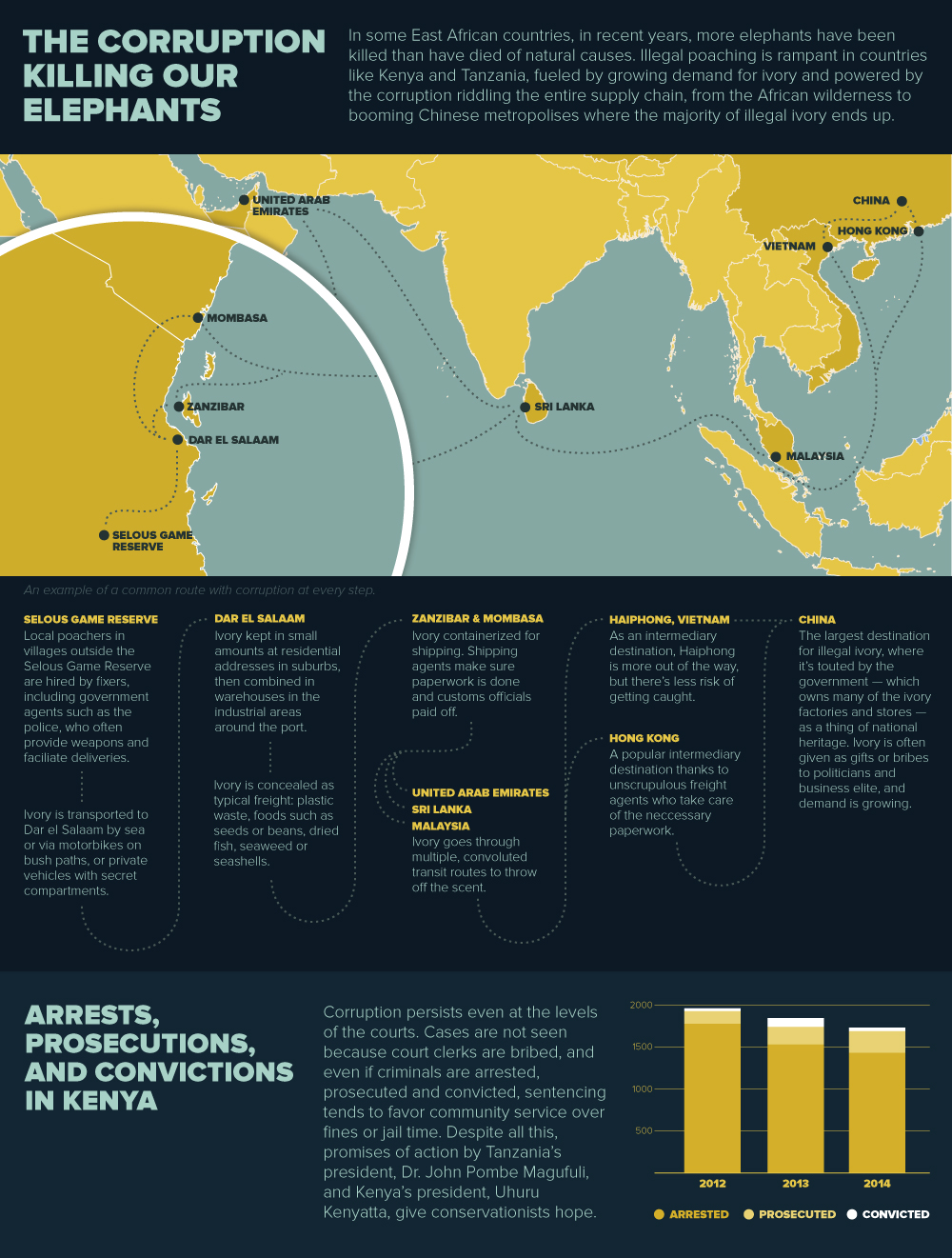
South African Environmental Affairs Minister Edna Molewa has downplayed concerns anti-poaching laws are not being not enforced. In January, she announced that for the first time in a decade, the poaching situation has “stabilized.”
“Considering that this is despite escalating poaching pressure, and in the face of an increased and relentless rise of poaching activity into protected areas – this is very very good news, and offers great cause for optimism,” she said at a January review of a new inter-governmental strategy to stop poaching.
The strategy, including the purchase of new forensic mobile crime scene units, is said to have helped lead to the arrest of 317 rhino poachers in 2015, up from 258 the previous year. A two-year-long investigation also resulted in the arrest of 15 high-level members of a poaching syndicate. In addition, 400 judges and prosecutors, and more than 1,000 border security guards are being trained to tackle illicit international trafficking of endangered species.
The efforts are helping, but poaching remains so serious in South Africa that some private game reserves are selling off their rhino because security costs and the threat of attacks outweigh the benefits of keeping the animals. That’s according to the International Union for Conservation of Nature, which on March 9 announced a record number of rhinos were killed across the continent in 2015.
Additional reporting by Wandiswa Ntengento.







